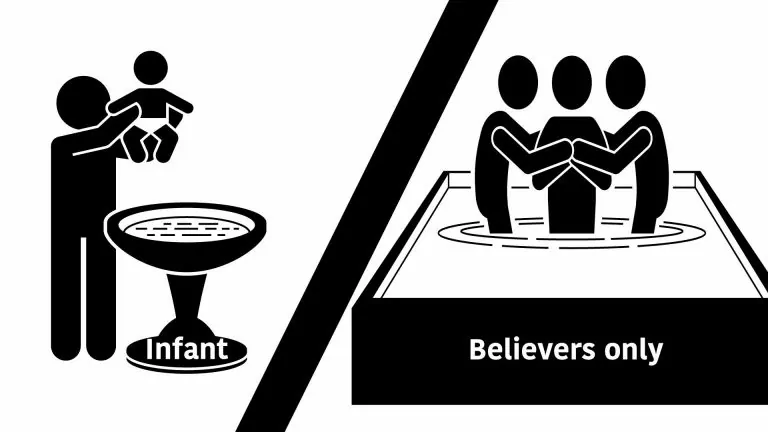The fundamental difference between the two positions is revealed in how one answers this question: Is baptism primarily God’s action or is it a human response?
The Bible tells us that we are dead in sin (Eph. 2:1). Consequently, it is God who makes us alive in Christ Jesus (Eph. 2:4). Even our faith, which is our response to God’s great work of salvation, is of divine origin. Faith itself is gift of God (Eph. 2:8). Infant baptism testifies to the grace of God in salvation: God is the one who initiates, acts and saves. Believers-only baptism testifies to our response of faith to God’s saving work in ourselves. On this view, baptism is a sign and seal of my public profession of faith in Christ Jesus.
An overlooked argument
There are plenty of helpful resources on infant baptism, and most of them rightly link baptism to circumcision. In Genesis 17, God promises to be “God to you [i.e. Abraham] and to your offspring forever (Gen. 17:7). There is great comfort in knowing that God binds himself by covenant to infants even before they can respond to him by faith. Truly, we love him because he first loved us.
Often overlooked, however, in the discussion on infant baptism are Paul’s remarks in 1 Corinthians 10:1-5. Although these verses do not provide a comprehensive understanding of infant baptism, they provide another important line of thought. Put simply: Paul assumes that New Testament baptism is the fulfillment of Mosaic baptism. Paul writes:
“For I do not want you to be unaware, brothers, that our fathers were all under the cloud, and all passed through the sea, and all were baptized into Moses in the cloud and in the sea, and all ate the same spiritual food, and all drank the same spiritual drink. For they drank from the spiritual Rock that followed them, and the Rock was Christ. Nevertheless, with most of them God was not pleased, for they were overthrown in the wilderness.” (1 Cor. 10:1–5)
Four observations
There are many golden truths that need to be mined from these few verses but consider the following four simple observations, which help us understand the meaning of infant baptism.
1. The Church is the new Israel
First, in 1 Corinthians 10, Paul applies lessons from Israel’s history to the church. Paul can do this only because he sees the church as the fulfillment of Israel: the church is the new Israel (Gal. 6:16). More specifically, Paul sees Mosaic baptism as having relevance for the Christian church. This explains why Paul can tell the Corinthians that this event – Israel’s baptism in the Red Sea – is an example for them (1 Cor. 10:6). The Old Testament is not a random collection of stories in which God interacts with a people that have no connection to us. No! For Paul, the Old Testament is part of our story. The story of Israel is the history of the church. These are our parents – these are our “fathers” (1 Cor. 10:1) – and since God does not change, he continues to relate to us in the same way he related to Israel: by means of the covenant.
2. In this case all means all
Second, Paul notes that all of Israel was baptized, ate the same spiritual food, and drank the same spiritual drink. In this case, “all” means “all.” The elderly, the infants and everyone in between were baptized. Whatever else we can say about this passage, it is clear that infants were baptized when they crossed the Red Sea, as they escaped from Egypt. And if infants were baptized, numbered among God’s people, and partook of Christ in the Old Testament, it only makes sense that they would enjoy the same privileges and blessings today.
3. The Red Sea was the work of God
Third, Israel’s baptism was pre-eminently the work of God. It was God who led our fathers by pillar of cloud. It was God who opened wide the Red Sea and provided the dry ground. It is true that the adults had to respond to God’s work by faith – they had to walk on the dry ground. And it is also true that the infants who could not walk, but were carried by their parents, were beneficiaries of this baptism. They were delivered from Egypt along with their parents.
4. Baptism is not a guarantee
Fourth, baptism does not guarantee salvation. Paul says that God was not pleased with most of Israel, and they were overthrown in the wilderness. Who were these people? They were the adults who rebelled against God and the leadership of Moses. They wandered in the wilderness for 40 years until they died off and their baptized children were old enough to enter the Promised Land. God was indeed the God to these children despite the apostasy of their parents, and their baptism reminded them of God’s faithfulness toward them.
Conclusion
There is much more than can be said about this passage. However, these brief observations are sufficient to lead us to the following modest conclusion: The Apostle Paul retells the story of Israel’s baptism in the Red Sea because he believed that they participated in an event that corresponds to the sacrament of Christian baptism.1
Endnote
1 Meredith G. Kline, By Oath Consigned: A Reinterpretation of the Covenant Signs of Circumcision and Baptism(Grand Rapids, MI: William B. Eerdmans Publishing Company, 1975), 67.
Rev. Garry Vanderveen blogs at Show, Don’t Tell where a version of this first appeared. It is reprinted here with permission.












